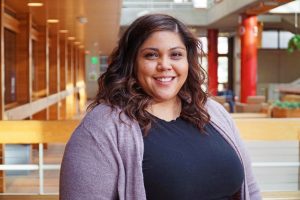The University of Utah Counseling Center has increased medication services, expanded appointments to 6 p.m. on Tuesday/Wednesday and hired two additional counselors, all thanks to the efforts of student leaders and a new $4 Mental Health Fee.
Claudia Reyes and Jack D. Haden, the two new counselors, share some of their tips for taking care of your mental health at the end of the semester—and beyond.
For more tips and support, be sure to click here and follow the Counseling Center on Instagram @uofucounseling.
Manage stress in these 10 ways:
[bs_well size=”md”][bs_row class=”row”]
[bs_col class=”col-sm-4″]

Jack D. Haden, LCSW
[/bs_col]
[bs_col class=”col-sm-8″]Since I was young, I’ve had a deep passion for stories and people. I hold the belief that all of us have a story to tell, but are often dissuaded from sharing it due to external and internal messages to withhold it. I’ve worked with a variety of groups including those on the autism spectrum, the LGBTQIA+ community and the geriatric population. Throughout my time as a clinician, I’ve repeatedly been amazed at the tales of resilience and bravery my clients have shared with me. As a therapist, I consider it a privilege to companion others, to find and share their stories and enjoy sitting with students as they navigate the challenges and joys of discovering who they are. I work from a feminist-multicultural standpoint, but have an integrative approach to my work with clients that include acceptance and commitment therapy, existential inquiry and cognitive behavioral work, with mindfulness practice sprinkled throughout.
On a personal level, I am a self-described “introvert supreme.” I find joy and rejuvenation in one-on-one dialogues with close friends, as well as in activities like yoga, writing and cuddling with my three cats while listening to a podcast. I’d be remiss if I didn’t have a book readily at hand—no matter where I find myself—and probably spend far too much money and time scouring the shelves of my local independent booksellers. As a kid who grew up playing piano competitively, music has a soft spot in my heart. I have a wide variety of musical interests ranging from classic punk to gypsy jazz to avant-garde rock and am always open to finding new and exciting artists. Last, but certainly not least, connecting with others who share a passion for social justice, as well as sarcastic irreverence, over a good cup of coffee is something I value greatly.[/bs_col]
[/bs_row][/bs_well]
[bs_well size=”md”][bs_row class=”row”]
[bs_col class=”col-sm-4″]

Claudia Reyes, LCSW
[/bs_col]
[bs_col class=”col-sm-8″]I am a licensed clinical social worker with a bachelor’s degree in social work with a minor in Chicana/o studies and a Master of Social Work, both from the University of Utah. I believe that everyone is the expert of their own experience and that my role in therapy is to help facilitate growth towards client directed goals. I practice therapy from a feminist multicultural foundation with integrated methods from cognitive behavioral therapy, solution focused therapy and motivational interviewing. To me, being a feminist multicultural practitioner allows me to acknowledge power differential in the therapeutic relationship and also being aware that social/political/cultural factors can be a source of empowerment and at the same time may be barriers to healing. I feel quite privileged to be joining the team at the University of Utah Counseling Center and have worked with students the past five years of my career with students from different walks of life at the elementary and secondary levels. I am passionate about education because higher education has been my own way out of poverty and did not come without challenges. I am a first-generation, Latina college graduate and at times throughout my educational career, I have identified as an out of state traditional student, a transfer student from a different university and a non-traditional student single parent. Through navigating these challenges, I was able to find resources and support through different centers and offices on campus that supported in ways that I was able to complete both of my degrees here at the U and I work daily to be a source of support for students that I have the privilege of serving.[/bs_col]
[/bs_row][/bs_well]
